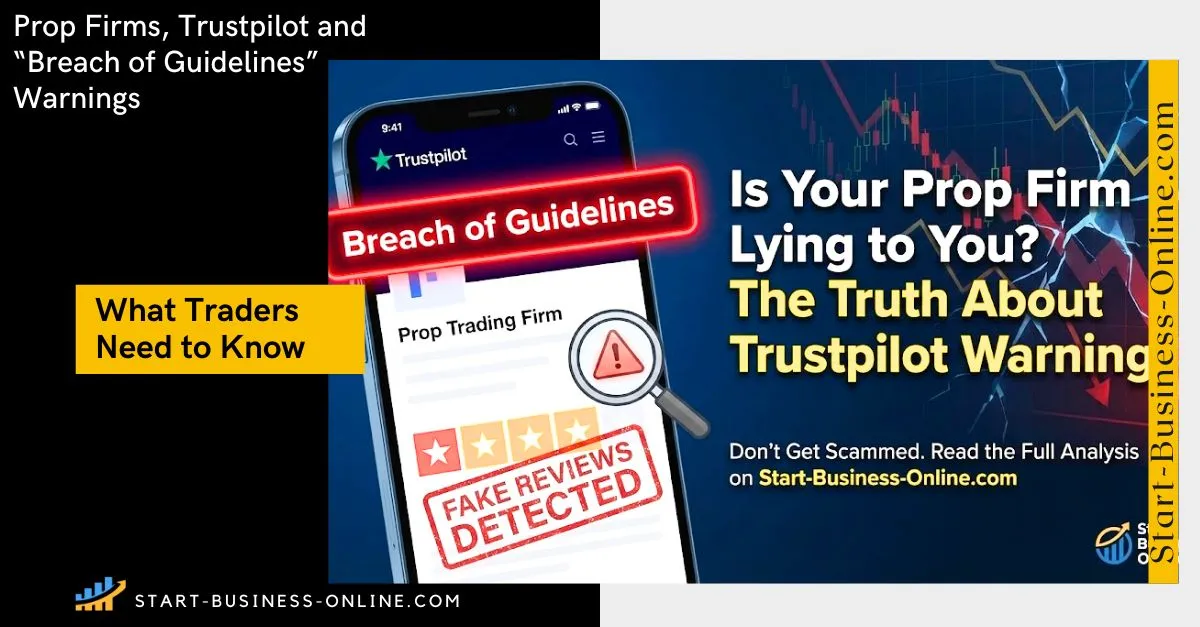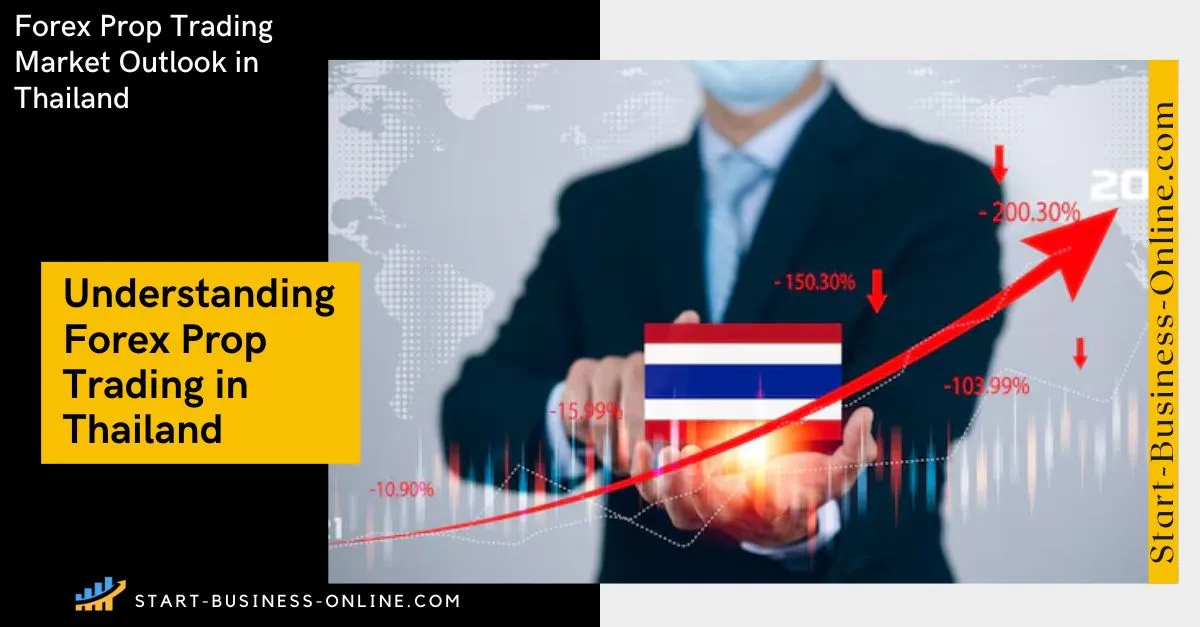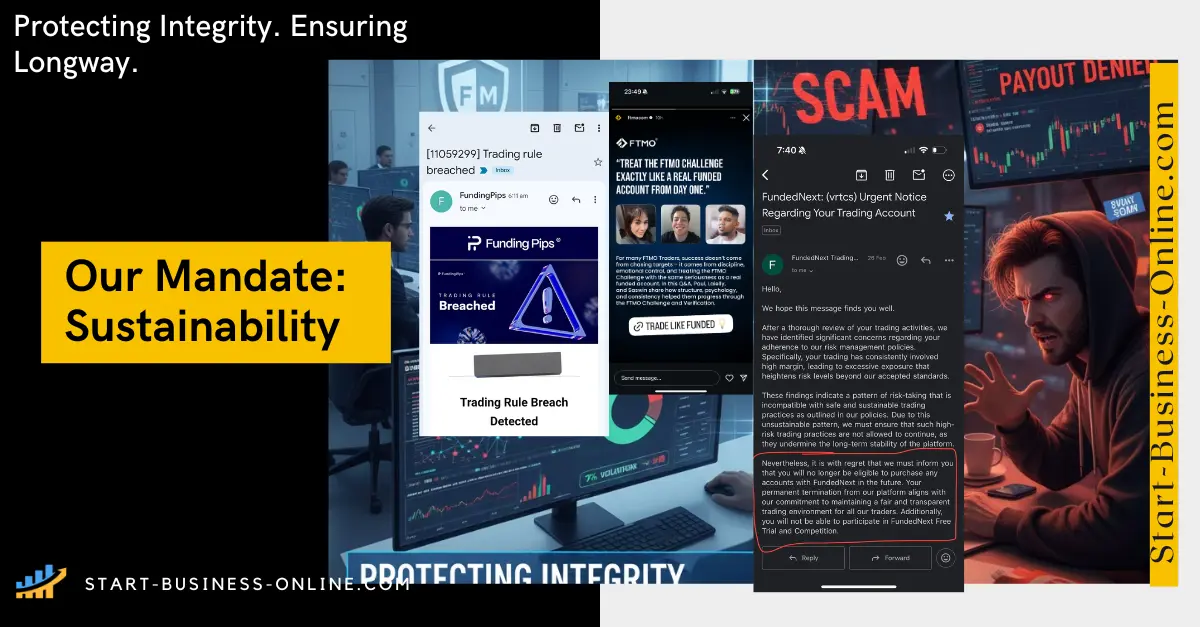Urged by the exponential growth of the prop trading niche as well as spurred by recent examples of firms being forced to shut down amidst allegations, the start-business-online team has crafted the Forex Prop Trading Scams Guide, your essential companion for navigating the trading landscape, especially in relation to prop trading scams. Whether you're a seasoned investor or a novice into the game, arming yourself with knowledge is vital to avoid potential scams and pitfalls. This guide equips you with insights into the most prevalent forex and prop trading scam models. You'll discover how to identify scammers and what steps to take if you've already been ensnared by their tactics.
The realm of traders' funding through prop firms remains largely unregulated, providing fertile ground for companies to make lofty promises and distort reality. Unfortunately, many individuals fall victim to these schemes, particularly when they pay fees for challenges or tests but receive no funding in return. Early detection serves as your strongest defense and shield against forex scams. Stay vigilant and informed to safeguard your investments and financial well-being.
Potential Prop Firms Scam
Are you a possible victim or do you think that you might have encountered a fraudulent prop trading firm? To assist traders in safeguarding against forex scams, we've compiled information from top-tier regulatory watchlists such as the FCA and the CFTC as well as other relevant data in order to craft the table below. The following list highlights prop trading scams exhibiting numerous red flags commonly associated with forex prop scams.
Unlisted Prop Trading Firms
NOTE: We are constantly updating our unlisted firms page, based on recent data, so that it reflects which firms we feel should not be trusted.
Prop Firms that have Shuted Down Operations
| Prop Firm | Note |
|---|---|
| Bbull trading | |
| Big Pip Funding | |
| Bulls Eye funding | |
| BuoyTrade | |
| Consummate Funding | |
| Destined To Traders | |
| DTT Funding | |
| Elite Traders Capital | |
| FCF Funding | |
| Firmity Funding | |
| ForexNChill | |
| Fortunes Funding | |
| Funds for Traders | |
| FX Prime Funding | |
| FXGet Funded | |
| FXTE FUNDING | |
| Gapat Trading | |
| Global Funders | |
| Global Traders Funding | |
| Goat Forex Funds | |
| Goat Trader Funding | |
| GTA Funding | |
| HedgeFund Funding | |
| HFunds | |
| Indigo Trader Funding | |
| Investiq | |
| Legacy Funding traders | |
| Legacy Prop Trading | |
| LFTT Funding | |
| Lync Funding | |
| MyForexFunds | |
| MyTradingFirm | |
| Nova FUNDING | |
| PF888 funding | |
| Pro Trader Funding | |
| Push Button Trading Prop Firm | |
| Right Now Funding | |
| Rocket21 | Reopen Doors |
| Silveer Arrow Funding | |
| SIP Funded | |
| Skilled Funded Trader | |
| Sola Funding | |
| Stealth Trader | |
| Swift Funding | Accounts migrated to MyFundedFX |
| TheFundedTrader | Reopen Doors |
| TheWandedTrader | |
| ThorFX | |
| Trade Wave Funding | |
| Tradeourcapital | |
| Trader Funding Program | |
| TraderFinanzia | |
| True Forex Funds | |
| TSG Prop firm | Changed to Global Prop Trader |
| UZ Trading Prop Firm | |
| Varsity Traders Club | |
| Vertex Funding | |
| ZE Funding |
What fraudulent schemes are most used by prop scammers?
- Challenges and contests: It's common for proprietary firms to conduct competitive evaluations before entrusting traders with capital, and this practice is understandable. However, if a company requests a trader to open a real account and deposit their own funds, it's a clear indicator of potential fraud. Moreover, fake prop firms often allow repeated participation in such contests, a practice that should raise suspicions. To ensure participants exhaust their deposits, scammers tightly restrict competition duration and set nearly unattainable conditions. In contrast, legitimate proprietary firms conduct contests using demo accounts, with no involvement of traders' personal capital.
- Penalties: This type of scam typically arises during the profit withdrawal stage. To avoid paying traders their rightful share, scammers may invoke a purported claim from a liquidity provider, alleging that the proprietary firm must pay a penalty far exceeding the trader's profits. Consequently, traders find themselves in debt to the company. Additionally, scammers may levy fines on traders for supposed violations of company rules and strategies, often without prior warning. These fines may be arbitrary and ambiguously defined, often buried in fine print. Illegal proprietary firms tend to rush traders, leaving little time for consideration and clear thinking.
- Initial Payment: Reputable proprietary firms never demand upfront payments from traders. Scammers often exploit vulnerabilities by promising to manage substantial sums of money. However, to access the full capital, traders are required to pay a nominal fee for opening an account (typically, scammers demand up to $500 from victims). The scheme typically concludes with scammers ceasing all communication with the deceived user after receiving the requested amount.
- Phishing websites: Scammers craft counterfeit websites mimicking legitimate ones to trick traders into divulging their personal information. With this data, scammers can breach your account and abscond with your funds.
- Fabricated Success Stories: To lure traders into a false sense of guaranteed success, scammers publish fictitious tales on their official website. These stories depict individuals, every day people with low-paying every day jobs, who purportedly transformed their lives by venturing into prop trading, amassing multimillion-dollar fortunes as a result. Naturally, all the images featured on the fake prop firm's website are stock photos and none of the supposed newly-made millionaires are real people.
- Training fees: In a proprietary company, traders function essentially as employees, and it is the firm's duty to provide training. If a company requests payment for your training, it raises concerns and warrants caution.
Top signs you might be dealing with a prop scam
There are several signs that should act as warning lights to help you recognize you are dealing with a scammer scheme only interested in their own profit, such as:
- Ambiguous profit-sharing arrangements: Legitimate proprietary firms offer transparent and structured profit-sharing agreements. If this vital clause is conspicuously absent from the firm's website or if managers skirt around specifics during conversations, it's advisable to keep away. In short, if clear terms are missing, then you should keep searching.
- Alluring yet improbable promises: Scammers often entice traders with promises of unrealistically high profits. Exercise caution with prop firms that dangle the lure of quick and effortless money. In short, if it sounds too good to be true, then it isn’t!
- Concealed fees: Deceptive prop companies frequently spring unexpected additional fees on unsuspecting clients. These fees, such as undisclosed taxes or hidden account maintenance charges, surface after the initial agreement. Make sure you keep away from such nasty surprises!
- Pressure tactics: Scammers employ tactics to coerce their targets into hasty decisions. If managers display excessive urgency and deprive you of the opportunity for thoughtful consideration, it's a clear red flag and a sure bet that something is off.
- Adverse feedback: Prior to engaging in any partnership with a prop firm, it's imperative that you exhaustively consult the available reviews about the company. If the prevailing sentiment among reviews leans overwhelmingly negative, it's unlikely that you'll profit from involvement with the firm, so it is best that you keep away.
Tips for Avoiding Scams and Fraud in Trading Delisted Companies

To safeguard yourself from scams and fraudulent activities while navigating the complexities of trading, it's crucial to follow these guidelines and strive to stay informed. Remember, making informed decisions is vital for success in any trading venture.
- Acknowledge the Risks: Trading in prop trading firms carries inherent risks. Though this is true for all trading endeavours, the risk is perhaps higher when it comes to prop trading. Some companies are excluded from our guide as we have noticed they are plagued by financial troubles, regulatory issues, or poor performance. Investing in such firms demands extra caution and thorough investigation.
- Conduct Due Diligence: Before investing, thoroughly research the delisted company. Examine its financial track record, management team, business model, and the reasons behind its delisting. Scrutinize available data to gauge the company's potential and assess if it's worth the risk, thus forming your own opinion based on your own risk appetite.
- Seek Professional Advice: If you suspect you've fallen prey to a scam involving prop trading firms, consider consulting with experts for guidance as soon as possible to avoid things getting worse.
- Diversify Your Investments: Minimize risk by diversifying your investment portfolio. Avoid putting all your resources into delisted companies. Spread your investments across various assets to lessen the impact of potential losses, as it is preferable to have your risk spread across multiple baskets.
- Exercise Caution with OTC Markets: Many companies trade on Over-the-Counter (OTC) markets, which are less regulated and thus more prone to manipulation. Be cautious when trading on such platforms and verify the legitimacy of listed companies employing this model.
- Stay Updated: Keep abreast of relevant news, developments, and regulatory changes that may impact prop trading firms or the overall trading landscape. Staying informed helps you avoid being blindsided by unexpected events, which are not uncommon in this fast-paced ecosystem.
- Know When to Exit: Despite careful research and caution, investments in prop trading firms may not always succeed. Be prepared to exit if a company's prospects decline or if your investment thesis proves faulty. Learning from your mistakes is integral to becoming a savvy trader, but exiting quickly is crucial for mistakes not to turn into an overall disaster.
- Report Any Suspicious Activity: If you encounter suspicious behavior or suspect you've been scammed by a prop trading firm, report it promptly to the relevant authorities. Reporting not only safeguards you but also helps preserve the integrity of financial markets. Though prop trading is not as heavily regulated as other trading endeavours, there is a growing tendency for regulators and watchdogs to be tightening their grip on this niche too.
What to do if you are already a victim of prop scammers

If one has already fallen into the trap of scammers and has suffered significant losses in capital, giving tips on how to recognize potential fraudulent firms is of no use. If you find yourself in the unfortunate situation of having resorted to the prop company for restitution and compensation but have had no response it probably means you have already fallen victim to prop scammers, so here's what you can do next:
- Cease Money Transfers: The foremost step is halting any further funds transfers. Despite promises of guaranteed profits upon payment of fines, refrain from believing such claims. Scammers use this tactic to extract more money from victims.
- Gather Evidence: Document correspondence, transfer receipts, phone call records, and feedback from fellow traders about dealings with the prop company. This evidence will bolster your case against fraud and help you prove who is in the wrong.
- Lodge a Complaint with Financial Authorities: If the prop firm's website lists the regulatory body overseeing its operations, file a detailed complaint outlining the scam and attaching collected evidence. Collective complaints are ideal. While you may not recover your own funds, blacklisting by regulatory authorities safeguards others. Although the prop industry is still largely in the gray area of regulation, recent examples show how regulators and watchdogs across the globe are ready and willing to step in to safeguard traders and their rights.
- Leave a Review: Help prevent other traders from falling prey to scams by sharing your experience. Your honest review could dissuade someone from engaging with the prop firm. Spread the word on as many channels and communities you can to make it as impactful as possible. If scammers know they will be exposed they may feel less comfortable to continue scamming traders.
When entering into an official dispute with a prop firm, resolution might be impossible if you try to fight alone. Thus, you may need to resort to legal assistance from qualified professionals, however such help may be obtained for free if you sign up to a collective forum. Nevertheless, the best method to avoid such disputes is to choose to partner only with proven and trustworthy companies.
Prop trading scams FAQs
To ensure a prop firm's reliability, follow these steps: check for licensing, review key trading offers, scrutinize profit distribution terms (reliable firms typically offer ratios favoring traders from 70/30 to 90/10%), and assess user reviews.Key indicators of encountering fraudsters include: unclear cooperation terms, absence of legal documentation, incomplete or dubious website information, questionable trading platform origins, and use of coercive tactics.If scammed by a prop firm, gather evidence: correspondence screenshots, call recordings, fund transfer receipts, etc. Then, file an official complaint with relevant authorities based in your jurisdiction. Additionally, share a detailed review to warn other traders about the scam.The primary risks stem from fraudsters posing as reliable prop firms. These scammers often request fees, mandate training course purchases, and provide manipulated software to control assessment outcomes.Reclaiming lost funds is exceedingly rare, albeit exceptions exist. Proving the scam and identifying the perpetrator are crucial, yet challenging tasks. Online scams complicate matters further, and victims often voluntarily relinquish funds, making legal recourse nearly impossible.






